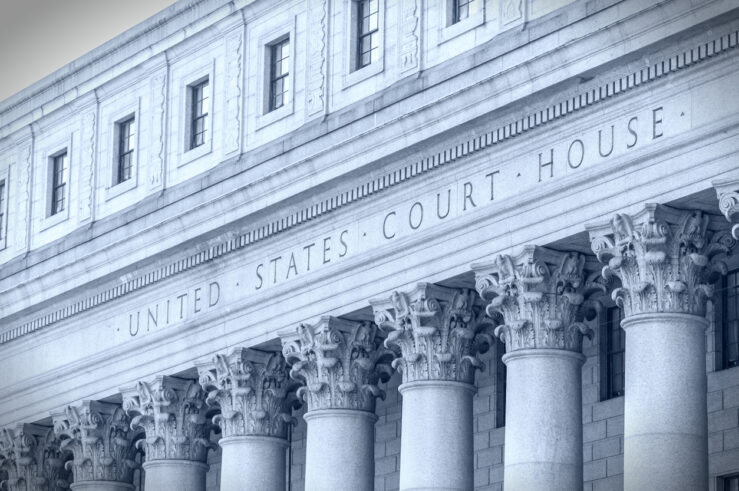Showing archive for: “News & Social Media”
FTC Biweekly UMC Roundup – Reform Dies in Committee Edition
Welcome back to the FTC UMC Roundup! The Senate is back in session and bills are dying. FTC is holding hearings and faith in the agency is dying. The more things change the more they stay the same. Which is a fancy way of saying that despite all the talk of change, little change seems ... FTC Biweekly UMC Roundup – Reform Dies in Committee Edition
The FTC’s Pre-Acquisition Review Requirement for All Meta Deals: Hyper-Regulatory, Anti-Free Market, Anti-Rule of Law, and Anti-Consumer
The Federal Trade Commission (FTC) wants to review in advance all future acquisitions by Facebook parent Meta Platforms. According to a Sept. 2 Bloomberg report, in connection with its challenge to Meta’s acquisition of fitness-app maker Within Unlimited, the commission “has asked its in-house court to force both Meta and [Meta CEO Mark] Zuckerberg to ... The FTC’s Pre-Acquisition Review Requirement for All Meta Deals: Hyper-Regulatory, Anti-Free Market, Anti-Rule of Law, and Anti-Consumer
New Frontiers of Fairness: Auto Da Fé by the Grand Inquisitor of Economics
July 26, 10 A.F. (after fairness) Dear Fellow Inquisitors, It has been more than a decade now since the Federal Neutrality Commission, born of the ashes of the old world, ushered in the Age of Fairness. As you all know, the FNC was created during the Online Era, when the emergence of the largest companies ... New Frontiers of Fairness: Auto Da Fé by the Grand Inquisitor of Economics
The Market Challenge to Populist Antitrust
The wave of populist antitrust that has been embraced by regulators and legislators in the United States, United Kingdom, European Union, and other jurisdictions rests on the assumption that currently dominant platforms occupy entrenched positions that only government intervention can dislodge. Following this view, Facebook will forever dominate social networking, Amazon will forever dominate cloud ... The Market Challenge to Populist Antitrust
The ABA’s Antitrust Law Section Sounds the Alarm on Klobuchar-Grassley
Sens. Amy Klobuchar (D-Minn.) and Chuck Grassley (R-Iowa)—cosponsors of the American Innovation Online and Choice Act, which seeks to “rein in” tech companies like Apple, Google, Meta, and Amazon—contend that “everyone acknowledges the problems posed by dominant online platforms.” In their framing, it is simply an acknowledged fact that U.S. antitrust law has not kept ... The ABA’s Antitrust Law Section Sounds the Alarm on Klobuchar-Grassley
Application of the Proper ‘Outer Boundary’ of Antitrust Liability for Alleged Refusals to Deal in New York v Facebook
Introduction The States brought an antitrust complaint against Facebook alleging that various conduct violated Section 2 of the Sherman Act. The ICLE brief addresses the States’ allegations that Facebook refused to provide access to an input, a set of application-programming interfaces that developers use in order to access Facebook’s network of social-media users (Facebook’s Platform), ... Application of the Proper ‘Outer Boundary’ of Antitrust Liability for Alleged Refusals to Deal in New York v Facebook
Attention Markets: They Know Them When they See Them
A raft of progressive scholars in recent years have argued that antitrust law remains blind to the emergence of so-called “attention markets,” in which firms compete by converting user attention into advertising revenue. This blindness, the scholars argue, has caused antitrust enforcers to clear harmful mergers in these industries. It certainly appears the argument is ... Attention Markets: They Know Them When they See Them
Does the Market Know Something the FTC Doesn’t?
During the exceptional rise in stock-market valuations from March 2020 to January 2022, both equity investors and antitrust regulators have implicitly agreed that so-called “Big Tech” firms enjoyed unbeatable competitive advantages as gatekeepers with largely unmitigated power over the digital ecosystem. Investors bid up the value of tech stocks to exceptional levels, anticipating no competitive ... Does the Market Know Something the FTC Doesn’t?
Merger Control’s Misaligned Incentives
Antitrust policymakers around the world have taken a page out of the Silicon Valley playbook and decided to “move fast and break things.” While the slogan is certainly catchy, applying it to the policymaking world is unfortunate and, ultimately, threatens to harm consumers. Several antitrust authorities in recent months have announced their intention to block ... Merger Control’s Misaligned Incentives
Mandatory Interoperability Is Not a ‘Super Tool’ for Platform Competition
On both sides of the Atlantic, 2021 has seen legislative and regulatory proposals to mandate that various digital services be made interoperable with others. Several bills to do so have been proposed in Congress; the EU’s proposed Digital Markets Act would mandate interoperability in certain contexts for “gatekeeper” platforms; and the UK’s competition regulator will ... Mandatory Interoperability Is Not a ‘Super Tool’ for Platform Competition
Online Display Advertising: What’s the relevant market?
Digital advertising is the economic backbone of the Internet. It allows websites and apps to monetize their userbase without having to charge them fees, while the emergence of targeted ads allows this to be accomplished affordably and with less wasted time wasted. This advertising is facilitated by intermediaries using the “adtech stack,” through which advertisers ... Online Display Advertising: What’s the relevant market?
How Changing Section 230 Could Disrupt Insurance Markets
In recent years, a diverse cross-section of advocates and politicians have leveled criticisms at Section 230 of the Communications Decency Act and its grant of legal immunity to interactive computer services. Proposed legislative changes to the law have been put forward by both Republicans and Democrats. It remains unclear whether Congress (or the courts) will ... How Changing Section 230 Could Disrupt Insurance Markets















